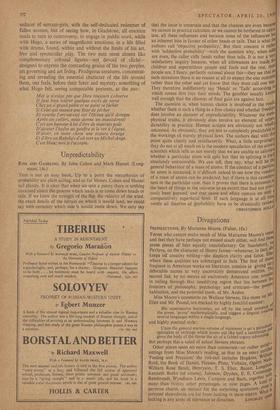Unpredictability
RISK AND GAMBLING. By John Cohen and Mark Hansel. (Long- mans, 14s,)
THIS is not an easy book. Up to a point the metaphysics of probability are plain sailing, and so far Messrs. Cohen and Hansel sail plainly. It is clear that when we spin a penny there is nothing uncaused about the process which leads it to come down heads or tails. If we knew the strength of the flip, the velocity of the wind. the exact details of the terrain on which it would land, we could say with certainty which side it would come down. We only say
that the issue is uncertain and that the chances are even because we cannot in practice calculate, or we cannot be bothered to taint' late, all these influences and because none of the influences has an inherent bias in favour of either heads or tails, That is what the authors call 'objective probability.! But their concern is rather with 'subjective probability'—with the question why, when odds are even, the caller calls heads rather than tails. It is not a veil satisfactory inquiry because, when all allowances are made for children and superstitious people and fools and the rest, most people are, I fancy, perfectly rational about this—they see that on such occasions there is no reason at all to expect the one outcome rather than the other and yet know that they must call one WO' They therefore indifferently say 'Heads' or 'Tails' according to which comes first into their minds. The gambler usually knows well enough that the chances of final gain are against him. The question is, when human choice is involved' in the result, whether there is such a thing as a free choice and whether freedom does involve an element of unpredictability. Whatever the meta' physical truths, it obviously does involve an element of unPrie' dictability in practice. Human actions are obviously not Wil°11! uncaused. As obviously, they are not as completely predictable a: the workings of merely physical laws. The authors deal with On, point quite clearly and satisfactorily. What, a little surprisingl?. they do not at all touch on is the modern speculation of the atomic scientists which tells us not merely that we are unable to calculatiei whether a particular atom will split but that its splitting is Ilse,. absolutely unknowable. We can tell, they say, what will be the general behaviour of a mass of atoms. If the conduct of a lar atom is uncaused, it is'ditlicult indeed to see how the conclue! of a mass of atoms can be predicted, but if there is this causeless, ness in the particular case, then it proves that there is unreason the heart of things in the universe to an extent that had not Pre". ously been guessed, and that cause and effect operate on only' comparatively superficial level. If such language is at all true' surely all theories of probability have to be drastically revised partial CHRISTOPHER not-LI


















































 Previous page
Previous page